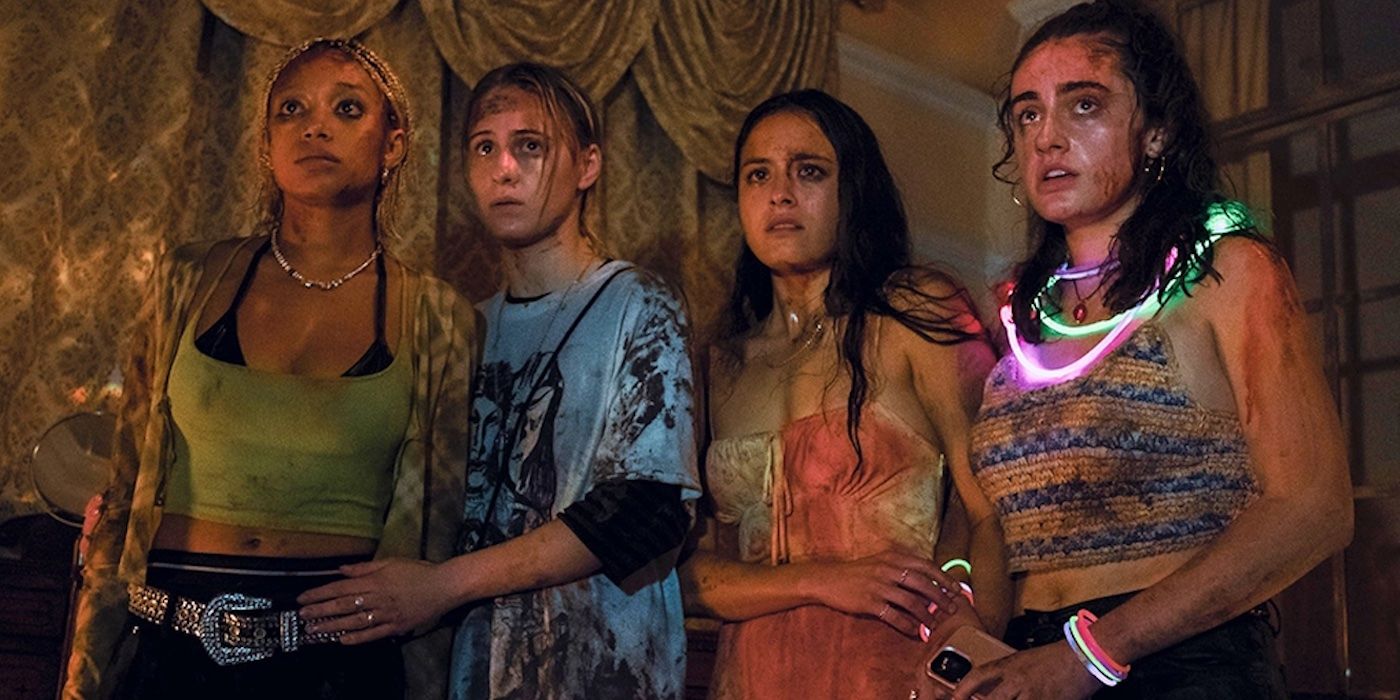Editor's Note: The following contains spoilers for Bodies Bodies BodiesAlthough it received positive reviews following its premiere at South by Southwest in March, the trailer for the slasher/mystery comedy Bodies Bodies Bodies was greeted with some consternation. No one could deny that it had a good pedigree - helmed by rising director Halina Reijin, written by Pulitzer Prize finalist Sarah DeLappe, and starring young talents including Amandla Stenberg, Maria Bakalova, and Rachel Sennott - but the marketing gave some viewers pause. Bodies positioned itself as a Generation Z satire, which can be very difficult to do without sounding like a conservative crank indignantly sputtering about pronouns. The trailer, which featured a bunch of self-absorbed twentysomethings using the typical buzzwords (“toxic,” “gaslighting,” “trigger”), didn’t help; neither did the tagline, “this is not a safe space,” which sounded for all the world like the name of a Ricky Gervais stand-up special.
Fortunately, it turns out there was no need to worry. Not only is Bodies a stylish, suspenseful thriller with laugh-out-loud dark comedy, but it’s also one of the sharpest satires of Gen Z to date. (If that sounds like hyperbole, well, the generation’s still young.) The sledgehammer-subtle jokes of the trailer were taken out of context - for instance, the character who says “you trigger me” is using the true, psychological definition of the term regarding her drug addiction. Everything from the clothes the characters wear to the music they listen to rings true: one gets the sense that Reijin and company know these people too well to dismiss them as snowflakes. Most importantly, Bodies understands that social media or progressive buzzwords are not dangerous in and of themselves; what makes them dangerous is how they’re used by narcissists and bad faith actors, which are present in every generation but newly empowered by this one.
Bodies is insightful about the ways smartphones and social media have fundamentally altered the brains of Gen Z, which is impressive considering the powers out for about three-quarters of the movie. Even before their “hurricane party” is spoiled by the storm knocking out the generators, the guests at David’s (Pete Davidson) mansion aren’t exactly glued to their phones. They have them on hand, and phones play a pivotal role in the plot, but these aren’t the stereotypical young whippersnappers who sit silently in a room and text each other. Except for the delightfully vapid podcaster Alice (Sennott), these characters are all capable of existing in the moment, focusing on the people in front of them. All of them can put their phones down and engage with the real world; the trouble is that social media has trained them to do so in a decidedly antisocial manner.
Almost as soon as they’re introduced, these characters show telltale signs of social media brain worms. There’s an obsession with image that’s particularly present in David, who’s fascinated by how “tough” a black eye makes him look and flinches with insecurity around Alice’s older, handsome boyfriend Greg (Lee Pace). There’s a belief that going offline is not only inconvenient but irresponsible - Jordan (Myha’la Herrold) chastises Sophie (Stenberg) for not keeping up with the group chat and the fact that Sophie just got out of rehab is barely considered an excuse. And everywhere one looks, there’s a casual, snarky kind of cruelty that’s become currency on Twitter and TikTok; it’s disguised as playful banter, but no one is ever really joking. David sneers to Sophie that her girlfriend Bee (Bakalova) is “cute in a school shooter kind of way” after she naively brings a loaf of zucchini bread as a gift to the party. Minor tics are caught and preyed upon: Jordan’s voice goes high when she lies and David’s girlfriend Emma (Chase Sui Wonders) has a habit of gulping. There’s an unspoken acceptance that, if you’re funny enough, you get to be as snide and unpleasant as you want - which is a big reason why social media has become so uniquely miserable.
The politics of Gen Z come under the microscope, too, but in a more interesting and subtle way than one might expect. It would have been too easy to make the shallow spoiled rich kids a bunch of card-carrying Bernie supporters; instead, in a classic instance of showing and not telling, Bodies explores the politics of these characters without having them explicitly talk about politics. For instance, none of the characters comment on climate change, but their blasé attitude towards an incoming hurricane says a lot about the fatalistic yet ultimately self-serving way plenty of privileged “zoomers” engage with the climate crisis. The hurricane party is supposed to be an act of defiance against a powerful storm - when the rain starts, David roars “is that all you got, motherfucker?!” - but the mansion allows them to shelter in relative comfort, at least before the deaths start. It doesn’t seem to be a particularly strong hurricane, either, judging from the fact that being sent outside is shown to be merely unpleasant rather than a death sentence. These people want to feel like they’re partying through the apocalypse, but they’re not the ones bearing the brunt of the climate disaster. (The fact that the isolating weather was changed from a snowstorm in Kristen Roupenian’s original script to a hurricane doesn’t feel like an accident.)
These characters are progressive in some ways but significantly less so in others. The lesbian relationship between Bee and Sophie is accepted without issue, but that doesn’t mean they’re immune from scorn based on stigmas against class, mental illness, and addiction. During a climactic fight scene, Bee confesses that she lied about graduating from college and having a job; she had to drop out to care for her mentally ill mother and the store she worked at closed a week after she was hired. In a deeply human moment, Bee admits that she lied because she worried her wealthy girlfriend would think less of her; of course, this is used by Jordan and Alice as another reason not to trust her. In that same scene, Jordan viciously rips into Sophie over her addiction, not showing a shred of empathy or understanding. No wonder no one talks about politics: in the hands of these people, it’s just another form of mutually assured destruction.
The cheapest, laziest way to satirize Gen Z is to mock them for caring, portraying them as spoiled brats using touchy-feely therapy-speak to avoid dealing with the hard truth of the real world. Bodies doesn’t do this; instead, it uses that touchy-feely therapy-speak to make the necessary point that much of this generation doesn’t actually care at all. Sometimes it’s a matter of benign self-absorption, as when Alice uses Bee’s confession about her mentally ill mother to discuss her own body dysmorphia. Other times, it’s more sinister: Jordan never uses the words “emotional labor” when seething about caring for Sophie during her addiction, but she makes it clear that she thinks Sophie is nothing but a waste of compassion. Most tellingly, conflict is conflated with abuse: to these people, every disagreement is personal, every belligerent is toxic, and every wound is purposeful and spiteful. Personal politics and trendy buzzwords are just tools to build themselves up and tear each other down.
Despite all this cynicism, Bodies Bodies Bodies doesn't hate Gen Z. If this movie had nothing but contempt, the killer would have been a typical slasher movie villain: an outside force put on this Earth to punish teenagers for their drunk, horny hubris. Without going too far into spoiler territory, that's not what happens in Bodies. Here, Gen Z could only ever destroy itself.



